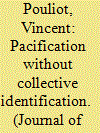|
|
|
Sort Order |
|
|
|
Items / Page
|
|
|
|
|
|
|
| Srl | Item |
| 1 |
ID:
079909


|
|
|
|
|
| Publication |
2007.
|
| Summary/Abstract |
Collective violence is a major cause of death, illness, and suffering. The theory of moral disengagement offers a framework for understanding and preventing violence between nations, and the Internet provides a vehicle for reaching a diverse population with a war-prevention program. The objectives of the PeaceTest project were to develop, implement, and evaluate a theory-based interactive website to be used as a war-prevention intervention for a general audience. The open-access site www.PeaceTest.org is an intervention to increase visitors' resistance to the cognitive processes of moral disengagement through risk assessment and tailored remediation. Evaluation of the program used a single-group pre-test-posttest design involving self-reported attitudes toward the use of military force. From 13 May to 15 September 2004, the site recorded 7,521 self-selected visitors from around the world; 5,702 (76%) completed the pre-test, and 338 (6%) of these completed the post-test. The intervention effect was examined using paired t-tests. A majority of respondents (75%) recorded PeaceTest scores indicating they were at risk of moral disengagement. Women, medical/public health students, older visitors, and non-US visitors showed significantly greater resistance to moral disengagement than other demographic groups ( p < 0.01). Resistance increased significantly among those who took the post-test (p < 0.01), especially among women. The number, predisposition, and characteristics of respondents were strongly affected by efforts to promote the site and by the site's launching at a time of intense public sentiment about the US-led war in Iraq. The authors conclude that the PeaceTest project demonstrated the potential to produce change in war-promoting attitudes in an unrestricted population, though findings must be interpreted in the light of study-design limitations. Controversy and publicity can briefly generate a large audience, but that audience may arrive with strong predispositions. Gaining widespread acceptance and use of a web-based public-health approach to war prevention remains a worthwhile challenge
|
|
|
|
|
|
|
|
|
|
|
|
|
|
|
|
| 2 |
ID:
079911


|
|
|
|
|
| Publication |
2007.
|
| Summary/Abstract |
Does the emergence of a security community require a collective identity? This constitutive relationship has been hypothesized by prominent scholars from Deutsch to Adler & Barnett. Yet the Russian-Atlantic case shows that collective identification is not a necessary condition for a nascent security community to emerge. In less than two decades, the relationship between Russia and the transatlantic community has quickly transformed from a deep-seated rivalry structured by the specter of mutual assured destruction to a partnership in which the possibility of military confrontation has undeniably receded. Although bones of contention and power struggles continue to abound, empirical indicators attest to the emergence of a nascent Russian-Atlantic security community. But survey data also show that Russian and Western peoples do not meaningfully identify with one another. While the lack of we-ness certainly helps explain the striking instability of the post-Cold War rapprochement between Russia and the transatlantic community, it also recalls the need for constructivists to pay attention to other variables than mutual representations in the study of international peace. As a way forward, the article advocates a practice turn in the study of security communities: peace exists as a social fact when diplomacy becomes the self-evident practice among security elites to solve interstate disputes
|
|
|
|
|
|
|
|
|
|
|
|
|
|
|
|
| 3 |
ID:
079910


|
|
|
|
|
| Publication |
2007.
|
| Summary/Abstract |
In 1974, Turkey divided Cyprus by military force into the north and south, giving the Turkish Cypriots full control of the north. Since then, the United Nations (UN) has attempted to resolve the Cyprus problem, but diplomatic efforts have always fallen short. In 2004, UN Secretary-General Kofi Annan proposed a plan that would reunify Cyprus. In a public referendum that followed, about two-thirds of Turkish Cypriots voted for the plan; however, three-quarters of Greek Cypriots rejected the plan. To help illuminate Greek-Cypriot public opinion, a telephone survey is conducted with 150 randomly selected Greek-Cypriot citizens (with a response rate of 87%). Results demonstrate that about four-fifths of respondents do not mistrust Turkish Cypriots and believe they can peacefully coexist with them. Still, 43% of respondents report that Greek Cypriots as a group are not very well prepared to reunify with Turkish Cypriots. Perception of ethnocentrism for both sides is found to be at comparable, mediocre levels. Narrative analyses suggest that the Annan Plan be revised to assure, among other things, (1) complete and timely demilitarization of the island, (2) removal of all Turkish settlers, (3) containment of extremist elements from both sides, and (4) fiscal backing from the international community to the Turkish-Cypriot side. The social and political implications of the findings, study limitations, and some future research needs are highlighted
|
|
|
|
|
|
|
|
|
|
|
|
|
|
|
|
| 4 |
ID:
079908


|
|
|
|
|
| Publication |
2007.
|
| Summary/Abstract |
Why do some minorities seek affirmative action while others pursue territorial autonomy or secession, given similar conditions at the substate level? This article attempts to unpack the puzzle of minority radicalization, focusing on group claim-making as an important dynamic that has been overlooked by much of the recent quantitative literature on ethnic conflict. To address this gap, the authors introduce a new `claims' variable, which codes the demands made by groups in the Minorities at Risk dataset for three five-year periods from 1985 to 2000. The authors examine the relationship between minority claim-making and rebellion and conclude that they are similar but distinct forms of group mobilization. Groups use claims as a means of bargaining with the center; relative power, therefore, has a critical influence on the extremity of demands that groups advance against the government. The authors test this model against alternative arguments using ordinal logit analysis and find that factors related to strategic power - including a history of autonomy, outside military support, and territorial concentration - are all positively correlated with a group's propensity to advance more extreme demands. This study shows that minorities with greater power vis-à-vis the center are more likely to both rebel and mobilize around separatist demands. However, minority rebellion - unlike separatist claims - may also be triggered by group deprivation, indicating that violent resistance may be driven by grievances as well as opportunities
|
|
|
|
|
|
|
|
|
|
|
|
|
|
|
|
|
|
|
|
|